Running a small business in Australia is a constant juggling act. You're the CEO, the marketer, the accountant, and the customer service rep, often all before your first coffee. While passion and hard work are essential, the right technology is the secret weapon that separates businesses that merely survive from those that thrive. The modern marketplace demands efficiency, and that's where the best small business apps come in. They automate tedious tasks, streamline communication, provide critical insights, and free up your most valuable resource: your time.
This guide is designed for the savvy Australian business owner who understands that working smarter, not just harder, is the key to sustainable growth. We've moved beyond generic lists to bring you a curated selection of 12 powerful applications, specifically chosen for their relevance and effectiveness in the AU market. We'll delve into each tool, exploring not just what they do, but how you can integrate them into your daily operations for maximum impact.
Forget surface-level reviews. For each app, we provide a detailed analysis, practical use-case scenarios, and honest assessments to help you make an informed choice. You'll find direct links and screenshots to guide your evaluation. From managing a flood of client calls with tools like OnSilent to simplifying your BAS statements with Xero or MYOB, these small business apps are your digital toolkit for building a more organised, profitable, and resilient business. Let's find the right software to help you scale.
1. OnSilent
Best For: Automated Voicemail and Call Management
OnSilent distinguishes itself as a premier choice among small business apps by transforming the often-dreaded task of voicemail management into a streamlined, automated process. It functions as an intelligent 24/7 call assistant, meticulously analysing and organising incoming calls and voicemails. This allows time-poor professionals like mortgage brokers, real estate agents, and tradespeople to bypass spam and prioritise urgent client communications, fundamentally changing how they interact with their phone.
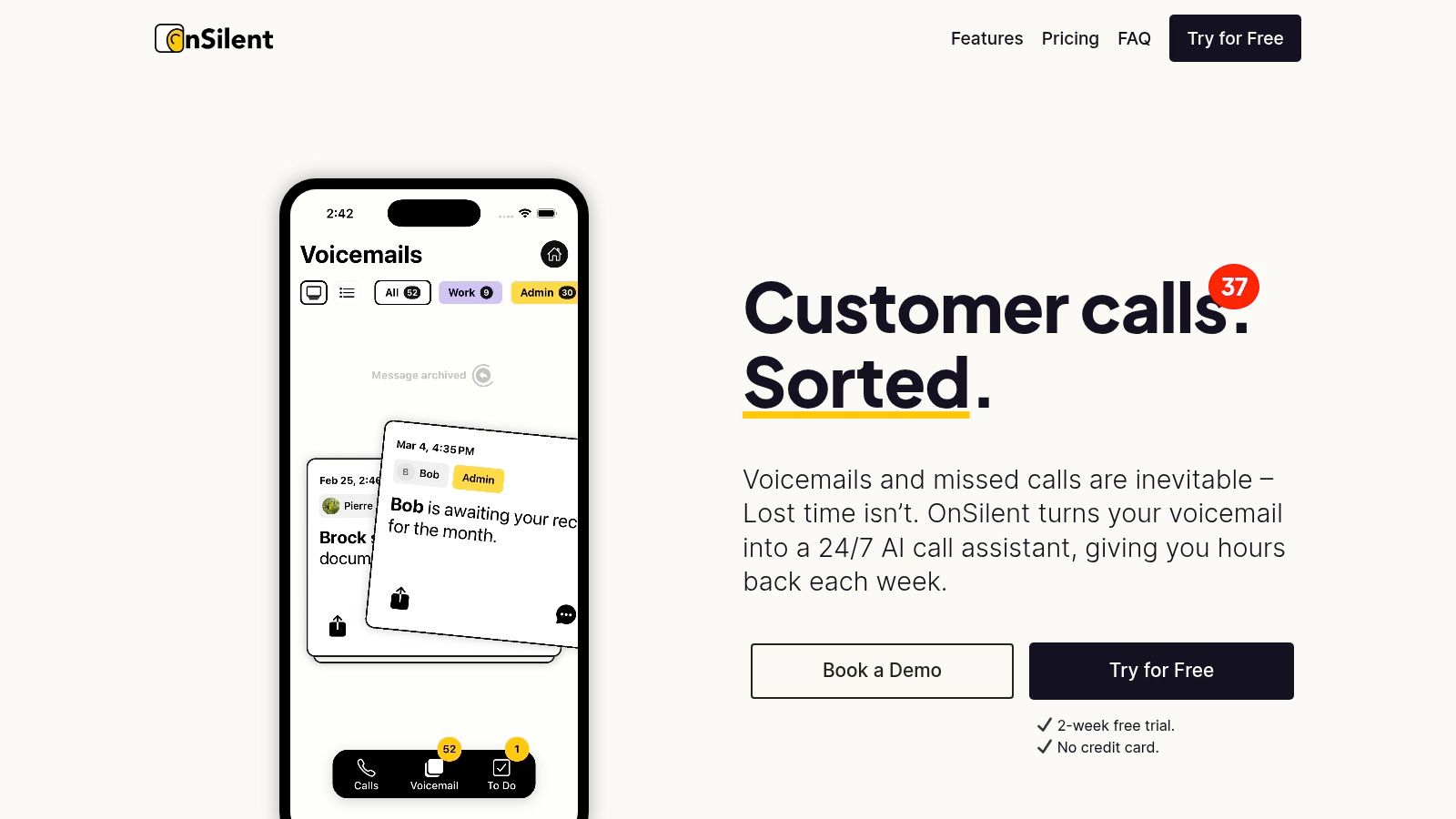
Unlike generic answering services or complex virtual receptionist platforms, OnSilent’s strength lies in its simplicity and powerful AI core. It integrates directly with your existing phone number, requiring no difficult setup or new hardware. The platform's ability to automatically filter spam and identify key business callers before you even listen to a message is a significant time-saver, with many users reporting they reclaim up to eight hours of administrative time each week. Its intuitive design, featuring simple swipe gestures to archive messages or pin them to a to-do list, ensures that critical follow-ups are never missed.
Key Features & Use Cases
- AI-Powered Voicemail Triage: The app automatically categorises voicemails, separating spam from legitimate business inquiries. A property manager can instantly see which calls are from tenants with urgent maintenance requests versus unsolicited sales calls.
- Seamless CRM & Software Integration: With over 100 integrations, OnSilent connects directly with your existing tools. A mortgage broker can have important client voicemails automatically logged in their CRM, creating a unified communication record without manual data entry.
- Intuitive Task Management: The swipe-to-pin feature converts a voicemail into a task. A busy tradesperson can quickly swipe to create a prioritised list of clients to call back, ensuring efficient scheduling and excellent customer service.
- Multi-Language Support: Supporting over 50 languages, OnSilent is an invaluable tool for businesses serving diverse communities, ensuring clear communication regardless of the caller's language.
Real-World Impact: OnSilent is more than a productivity tool; it’s a strategic asset. By handling the noise of constant calls, it empowers small business owners to focus on high-value activities that drive growth, rather than getting bogged down in administrative tasks.
Practical Considerations
OnSilent offers a no-obligation, two-week free trial without requiring a credit card, allowing you to fully assess its impact on your workflow. While it excels at filtering and organising calls, businesses requiring a live human to answer every call may still need a traditional receptionist. However, for professionals looking to optimise their communication efficiency, OnSilent provides a robust and cost-effective solution. To explore its capabilities further, you can find more details about its call management software on onsilent.com.
| Pros | Cons |
|---|---|
| Saves up to 8 hours weekly by automating call sorting | Lower call volumes may not see the full benefit |
| Advanced spam filtering and business caller ID | Does not replace live-answering services for personalised interaction |
| Seamless integration with over 100+ CRM and software tools | |
| Cost-effective and requires no extensive setup or new hardware | |
| 2-week free trial with no credit card required |
Website: https://onsilent.com
2. Microsoft Store Australia
For small businesses already embedded in the Windows ecosystem, the Microsoft Store Australia serves as a centralised hub for essential software. It’s less of a single app and more of a curated digital storefront, but its value lies in providing direct, secure access to the full suite of Microsoft's business tools. This makes it an indispensable resource for maintaining software compliance and integration.
The platform excels at offering a unified purchasing and management experience. For instance, a real estate agency can procure Microsoft 365 licences for its team, ensuring everyone has access to professional email via Outlook, secure cloud storage with OneDrive, and collaboration tools like Teams. Simultaneously, they can acquire licences for Microsoft Project to manage property development timelines or Visio to create detailed floor plans and office layouts. This integration is a key differentiator; the software is guaranteed to work together seamlessly.
Core Offerings and Use Cases
- Productivity Suite: Access to Microsoft 365 provides core small business apps like Word, Excel, PowerPoint, and Outlook, backed by a business-grade email server and cloud storage.
- Project Management: Microsoft Project is available for businesses needing robust tools for tracking complex projects, allocating resources, and managing budgets, ideal for trades professionals overseeing multiple job sites.
- Specialised Tools: The store also offers powerful software like Visual Studio for custom application development and Visio for professional diagramming and vector graphics.
While the subscription costs for some of these programs can be a significant investment, the robust security, regular updates, and extensive support resources provide considerable value. For any business prioritising stability and deep integration with its operating system, the Microsoft Store is the most reliable source.
Website: https://www.microsoft.com/en-au/store/b/software
3. Xero
For small businesses seeking to streamline their financial management, Xero offers a powerful yet user-friendly cloud-based accounting platform. Based in New Zealand and popular across Australia, it’s specifically designed to demystify accounting for non-accountants. Its strength lies in making complex financial tasks like bank reconciliation, invoicing, and payroll accessible and manageable directly from a clean, intuitive dashboard.
A key advantage for trades professionals or real estate agents is the ability to manage finances on the go. For example, a property manager can send an invoice for bond cleaning directly from their mobile device after a final inspection, or a builder can photograph a receipt for materials at the hardware store and upload it instantly for expense tracking. This real-time capability ensures financial records are always up-to-date, providing a clear picture of business health at any moment.

Core Offerings and Use Cases
- Automated Bank Feeds: Xero connects directly to your business bank accounts, automatically importing transactions and making reconciliation a simple, one-click process.
- Invoicing and Payments: Create and send professional invoices, track their status, and accept payments online through integrations with services like Stripe and GoCardless. It’s one of the essential small business apps for maintaining healthy cash flow.
- Extensive Integrations: With over 800 third-party app integrations, businesses can connect Xero to their CRM, project management software, or inventory systems for a truly synchronised workflow.
While the built-in inventory management is basic and may not suit complex retail operations, the platform’s accessibility and robust core features are ideal for service-based businesses. The strong community support and extensive online resources also make it easy to find answers and get the most out of the software without needing to be a financial expert.
Website: https://www.xero.com/au/
4. MYOB
For Australian small businesses seeking a robust accounting and business management solution, MYOB stands as a market leader. It is specifically engineered for the local regulatory landscape, providing powerful tools that ensure compliance from day one. Its primary strength is its deep integration with Australian tax systems, making it a go-to platform for businesses that prioritise accurate, streamlined financial reporting.
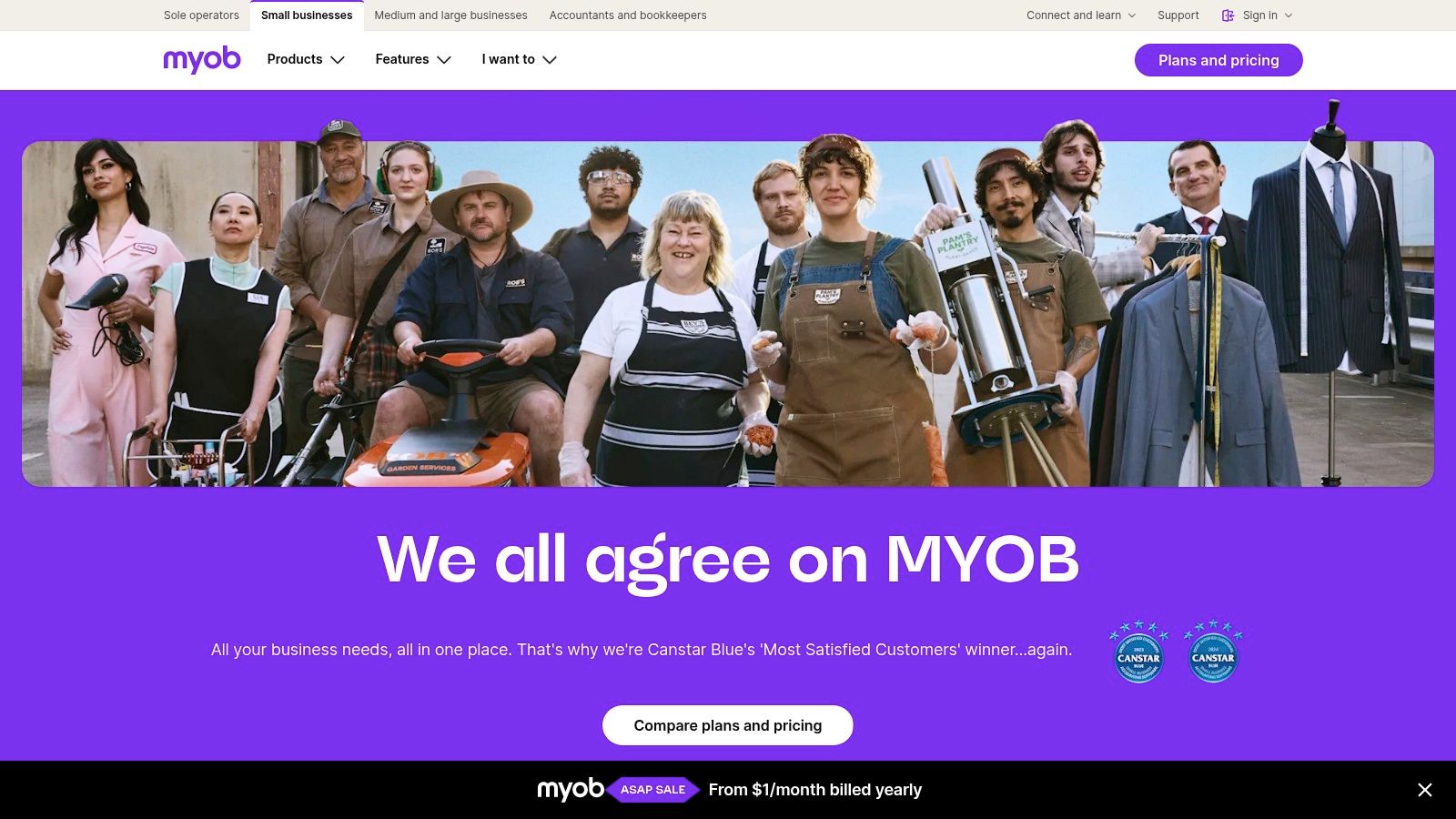
The platform is designed to scale with a business's growth. For example, a small trade business can start with a basic plan to manage invoicing and expenses. As it expands and hires staff, it can seamlessly upgrade to a plan that includes comprehensive payroll processing with Single Touch Payroll (STP) compliance, inventory management for tracking materials, and detailed job costing. This scalability is a key advantage, preventing the need to migrate systems as the business matures.
Core Offerings and Use Cases
- Accounting and Bookkeeping: MYOB delivers a full suite of tools for managing cash flow, tracking expenses, and reconciling bank accounts, making it one of the most comprehensive small business apps for financial oversight.
- Payroll and Compliance: Features fully compliant STP reporting, automates tax calculations, and manages superannuation, crucial for any business with employees in Australia.
- Inventory Management: Allows businesses like retail stores or trades professionals to track stock levels, manage suppliers, and set up automatic reordering to prevent shortages.
While some users note a steeper learning curve compared to more simplified competitors, the platform's depth is its main selling point. The access to a large network of MYOB-certified bookkeepers and accountants also provides an invaluable support system for businesses needing expert guidance.
Website: https://www.myob.com/au
5. Shopify
For small businesses aiming to enter the online retail space, Shopify offers a comprehensive, all-in-one e-commerce platform. It simplifies the entire process of setting up and managing an online store, from website design to payment processing and shipping. Its intuitive interface makes it an ideal starting point for entrepreneurs without extensive technical skills, allowing them to build a professional-looking storefront quickly.

The platform's real strength lies in its scalability and customisation. A trades professional, for example, could start by selling custom-made parts or merchandise directly to customers. As the business grows, they can integrate apps from Shopify’s extensive marketplace to add new functionalities like appointment booking, wholesale pricing, or advanced marketing automation. This ecosystem of powerful small business apps ensures the platform can evolve alongside business needs, making it a sustainable long-term solution. For those interested in maximising efficiency, you can learn more about small business automation tools that integrate seamlessly with platforms like Shopify.
Core Offerings and Use Cases
- Online Store Builder: Create a fully customisable online shop with a wide range of mobile-responsive themes, a drag-and-drop editor, and a secure shopping cart.
- Integrated Payment Processing: Shopify Payments allows for immediate acceptance of credit cards, but the platform also supports over 100 other payment gateways.
- Inventory and Order Management: Track stock levels, manage orders from a centralised dashboard, and set up automated shipping calculations and label printing.
- Marketing and SEO Tools: Built-in features help with search engine optimisation, email marketing campaigns, and social media integration to attract more customers.
While transaction fees are a consideration if not using Shopify’s native payment gateway, the platform’s ease of use, 24/7 support, and powerful feature set provide exceptional value. It stands as the go-to choice for businesses prioritising a quick launch and effortless store management.
Website: https://www.shopify.com.au
6. BigCommerce
For small businesses ready to scale their online retail operations, BigCommerce offers a powerful and comprehensive e-commerce platform. It provides the robust architecture needed for growth, combining advanced sales features with user-friendly management tools. Unlike some competitors that penalise growth with transaction fees, BigCommerce allows businesses to keep more of their revenue, making it a strategic choice for ambitious retailers.
This platform is particularly well-suited for businesses aiming for multi-channel sales from day one. For example, a boutique real estate agency selling branded merchandise or a trades professional offering specialised tool kits can manage their entire inventory across their own website, eBay, Amazon, and social media platforms like Facebook, all from a single dashboard. This centralised control simplifies operations and ensures a consistent customer experience.

Core Offerings and Use Cases
- Multi-Channel Integration: Natively sell on major marketplaces like eBay and Amazon, and social channels, synchronising inventory and orders automatically.
- Built-in Marketing Tools: Comes equipped with strong SEO features, discount and promotion engines, and email marketing integrations to drive traffic and conversions. Among the suite of small business apps, its marketing capabilities are a key asset.
- Scalable Architecture: The platform is designed to grow with a business, supporting high-volume sales without performance degradation. It fully supports AUD currency and GST tax configurations for the Australian market.
While the starting price point is higher than some entry-level options and the selection of free design themes is limited, the platform's extensive out-of-the-box feature set and lack of transaction fees provide significant long-term value. With 24/7 support, BigCommerce is an excellent solution for businesses that prioritise scalability and powerful, integrated e-commerce functionality.
Website: https://www.bigcommerce.com.au
7. Zoho CRM
Zoho CRM is a powerful, cloud-based platform that centralises sales, marketing, and customer support activities into a single, cohesive system. For small businesses in sectors like real estate or trades, where managing client relationships is paramount, Zoho offers an affordable and highly customisable solution. It stands out by providing an extensive suite of tools that can grow with a business, preventing the need to constantly switch platforms.
The platform's strength lies in its ability to unify disparate business functions. For example, a mortgage broker can use Zoho CRM to track a lead from the initial marketing email campaign all the way through to a finalised loan application. The system can automate follow-up emails, schedule client calls, and provide detailed reports on sales pipeline performance. This level of organisation ensures no lead falls through the cracks and that client communication is consistently managed, which is fundamental to building strong business communication skills.
Core Offerings and Use Cases
- Sales and Pipeline Management: Provides tools to automate lead scoring, deal tracking, and task allocation, helping sales teams prioritise high-value prospects.
- Marketing Automation: Enables the creation and management of email campaigns, social media marketing, and customer surveys directly within the CRM.
- Customer Support: Features a built-in ticketing system (in higher tiers) that allows businesses to track and resolve customer issues efficiently, improving client satisfaction and retention.
- Extensive Integration: Connects seamlessly with over 40 other Zoho small business apps, as well as numerous third-party services, creating a fully integrated operational hub.
While the interface can present a learning curve due to its extensive feature set, the value offered by its generous free plan and scalable pricing is undeniable. For small businesses seeking a comprehensive CRM without the enterprise-level price tag, Zoho CRM is an exceptional choice.
Website: https://www.zoho.com/au/crm/
8. Lightspeed
For small to medium-sized businesses in the retail and hospitality sectors, Lightspeed offers a powerful, unified commerce platform. It integrates a sophisticated point-of-sale (POS) system with e-commerce, payments, and analytics, making it a comprehensive solution for managing both physical and online sales channels from a single dashboard. This streamlined approach helps businesses maintain accurate inventory and gain a holistic view of customer behaviour.
The platform's strength lies in its ability to centralise complex operations. For example, a boutique clothing store can use Lightspeed to manage inventory across its brick-and-mortar shop and online store in real-time. When an item sells online, the stock level is automatically updated in the physical store’s POS, preventing overselling. This same system can also manage customer profiles, track purchase history, and run loyalty programs, creating a seamless experience whether a customer shops in-person or online.
Core Offerings and Use Cases
- Unified Commerce: Integrates POS and e-commerce, allowing businesses to manage in-store and online sales, inventory, and customer data from one place.
- Advanced Inventory Management: Provides real-time stock tracking across multiple locations, supplier management, and automated purchase ordering, which is ideal for cafes or retail chains.
- Customer Relationship Management: Built-in tools to create customer profiles, track spending habits, and implement targeted marketing campaigns.
- Detailed Analytics: Offers robust reporting on sales trends, product performance, and staff efficiency, turning raw data into actionable business insights.
While Lightspeed's pricing is at a premium compared to simpler POS systems, its extensive feature set and scalability provide significant long-term value. For businesses aiming to grow and unify their retail operations, it stands out as one of the most robust small business apps available.
Website: https://www.lightspeedhq.com.au
9. Square
Square has become a cornerstone for Australian small businesses, particularly those in retail, hospitality, and service industries, by offering an integrated ecosystem of commerce tools. It simplifies the entire sales process, from accepting payments in-person to managing online sales, all through a remarkably user-friendly interface. For businesses that need to get up and running quickly, Square removes significant technical and financial barriers.
The platform's strength lies in its unified approach. A local cafe, for instance, can use the free Square Point of Sale app on an iPad to take orders and process payments, while its inventory is automatically updated in the backend. Simultaneously, they can use Square Online to create a simple website for pre-orders and local delivery, with all sales data flowing into a single, comprehensive dashboard. This seamless integration makes it one of the most practical small business apps for managing day-to-day operations without needing complex software.
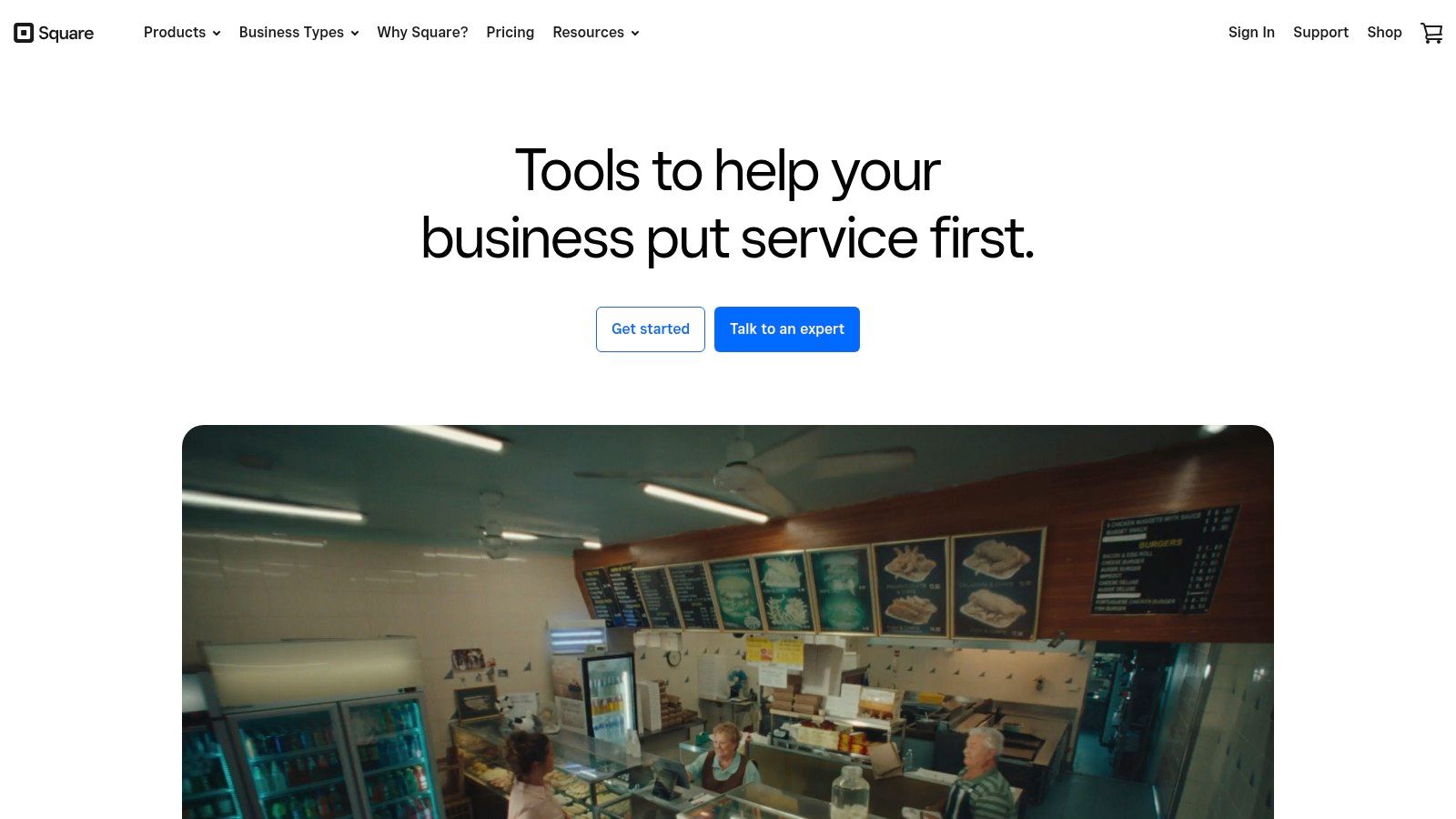
Core Offerings and Use Cases
- Payment Processing: The core function allows businesses to accept credit card, debit card, and digital wallet payments in person, online, or via invoices. The pay-per-transaction model is ideal for new or low-volume businesses.
- Point of Sale (POS) System: The free Square POS app turns a smartphone or tablet into a full-featured checkout system, complete with inventory tracking, sales reporting, and customer management.
- Online Store Builder: Businesses can create a functional e-commerce site with Square Online, which integrates directly with their payment processing and inventory, perfect for trades professionals selling merchandise or property managers offering paid services.
While the transaction fees can become a considerable expense for high-turnover businesses and the online store's customisation options are basic, the platform's ease of use is unmatched. The absence of monthly fees for its foundational services makes it an accessible and powerful starting point for any small enterprise focused on selling products or services.
Website: https://squareup.com/au
10. Pronto Software
For small to medium-sized businesses that have outgrown individual apps and require a single, unified system, Pronto Software offers a powerful Enterprise Resource Planning (ERP) solution. It centralises core business operations, integrating financials, inventory, customer relationships, and manufacturing into one cohesive platform. This makes it an ideal choice for businesses seeking to streamline complex processes and gain a holistic view of their operations.
Unlike standalone small business apps, Pronto Software provides a fully integrated ecosystem. For example, a property development company can use it to manage everything from contractor payments (financials) and building material stock levels (inventory) to sales leads for new units (CRM) and project timelines (manufacturing/project planning). This level of integration eliminates data silos and ensures all departments are working with the same real-time information.

Core Offerings and Use Cases
- Financial Management: Comprehensive accounting tools for general ledger, accounts payable/receivable, and asset management, suitable for real estate agencies managing complex trust accounts.
- Inventory and Supply Chain: End-to-end management of stock, purchasing, and logistics, critical for trades professionals needing to track materials across multiple job sites.
- Customer Relationship Management (CRM): Tools to manage sales funnels, customer interactions, and marketing campaigns, helping businesses nurture leads and improve client retention.
- Business Intelligence: Powerful reporting and analytics tools that transform raw operational data into actionable insights for strategic decision-making.
While the initial investment and implementation period are more significant than with off-the-shelf apps, the long-term benefits of a customisable, all-in-one system are substantial. Pronto’s strong local support and ability to tailor the solution to specific industry needs provide a robust foundation for businesses poised for growth.
Website: https://www.pronto.net
11. WORKetc
For businesses seeking to escape the complexity of juggling multiple, disconnected software solutions, WORKetc offers a unified cloud-based platform. It integrates CRM, project management, billing, and customer support into a single, cohesive system. This all-in-one approach is designed to streamline operations, reduce data silos, and provide a single source of truth for all business activities, making it one of the most comprehensive small business apps available.
The platform’s strength lies in its ability to manage the entire customer lifecycle from one dashboard. For example, a property management firm can capture a new lead in the CRM, convert it into a project for a rental fit-out, manage tasks and timelines, invoice for the work, and then handle ongoing support tickets from the tenant all within WORKetc. This level of integration eliminates the need to manually transfer data between separate sales, project, and accounting systems.
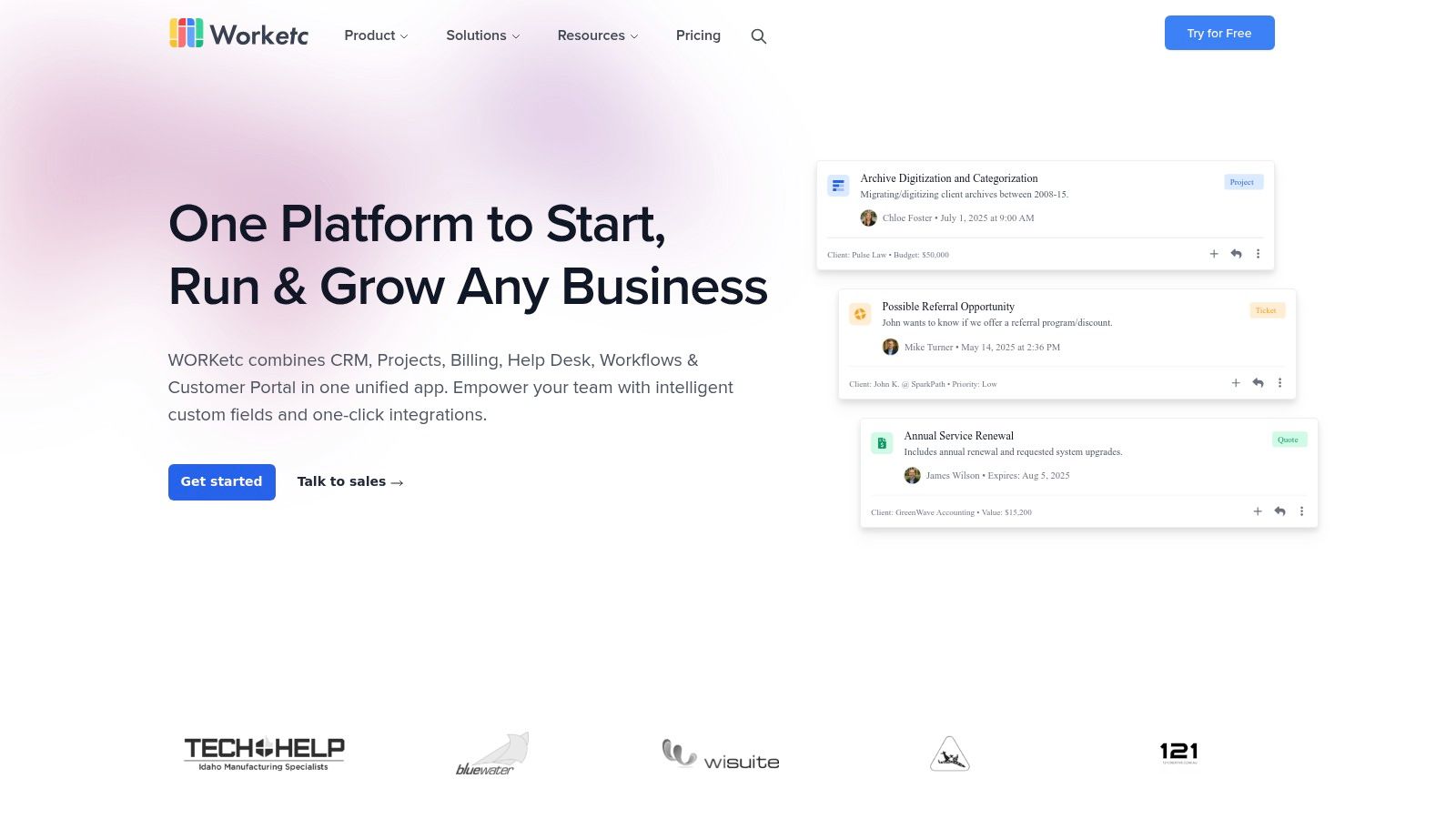
Core Offerings and Use Cases
- Integrated CRM: Manages sales pipelines, contacts, and lead activities. A real estate agent can track potential buyers, log communications, and set follow-up tasks directly linked to a specific property listing.
- Project Management: Features include task dependencies, timesheets, and Gantt charts. This is ideal for trades professionals who need to coordinate subcontractors, track job progress, and monitor budgets for multiple construction projects simultaneously.
- Billing and Invoicing: Allows for the creation of invoices directly from projects or timesheets, supporting recurring invoices and online payments.
- Help Desk Support: A built-in ticketing system helps manage customer enquiries and support requests efficiently, ensuring nothing is missed.
While some users find the interface complex with a notable learning curve, the benefit of having every core business function in one place is a significant advantage. The pricing structure may be higher than standalone solutions, but it often proves more cost-effective than subscribing to four or five separate applications.
Website: https://www.worketc.com
12. Flippa
For entrepreneurs looking to bypass the startup phase, Flippa is a global marketplace for buying and selling online businesses, domains, and digital assets. Instead of building from scratch, a small business can acquire an established e-commerce store, a content website with existing traffic, or even fully functional small business apps. This makes it a strategic resource for rapid expansion or market entry.
Flippa's value lies in its transparent, auction-style and fixed-price listings, which provide deep insights into a business's operational history. For example, a property management company could acquire a small, profitable SaaS tool for tenant communication, instantly adding a new revenue stream and service offering. The platform facilitates this by providing verified data on traffic, revenue, and expenses, allowing for an informed purchasing decision.
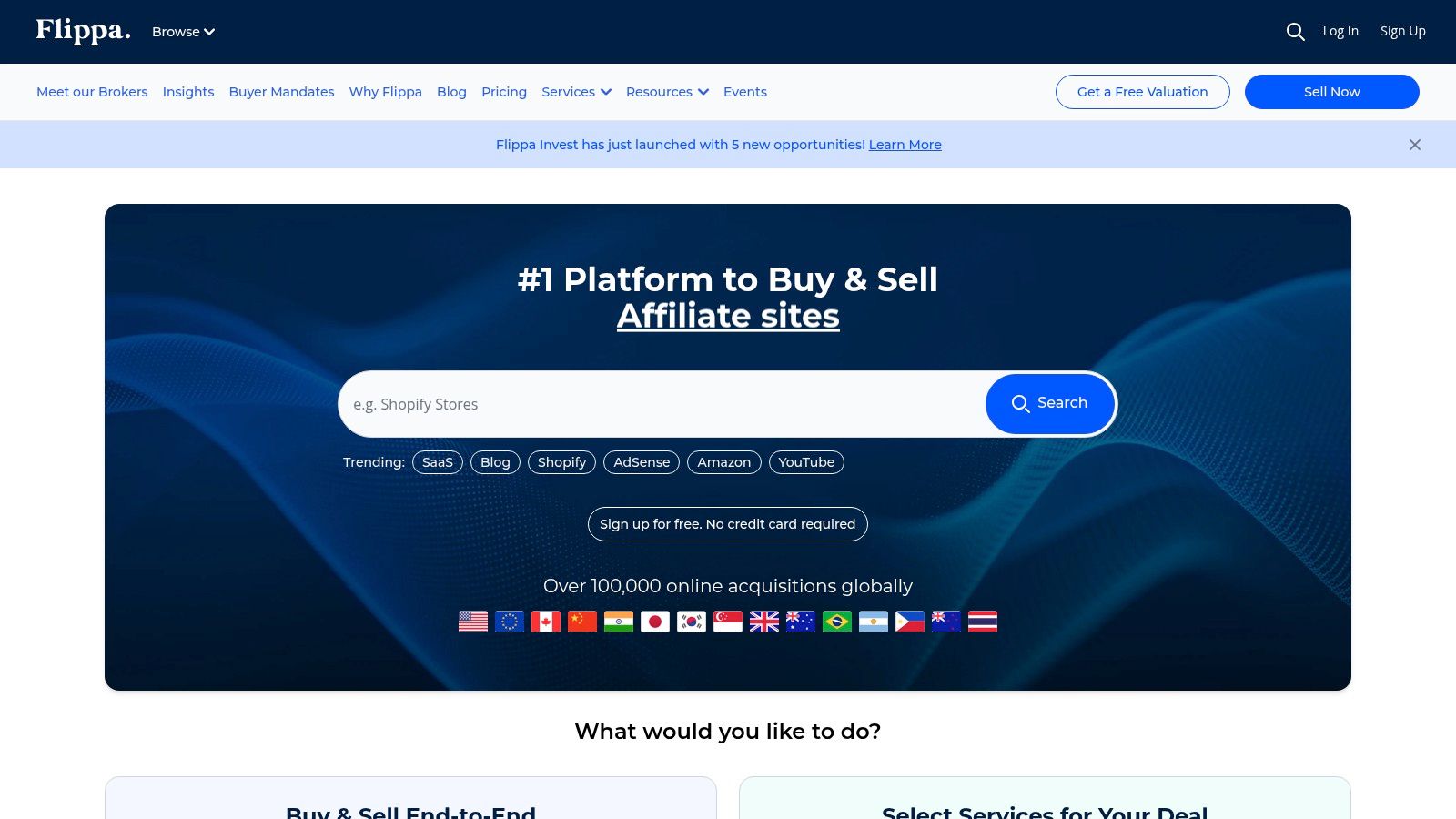
Core Offerings and Use Cases
- Business Acquisition: Buy established online businesses including e-commerce sites (Shopify, Amazon FBA), content blogs, and SaaS platforms with pre-existing customer bases.
- Digital Asset Trading: Purchase domains, mobile apps, and social media accounts to accelerate a marketing strategy or brand launch.
- Due Diligence: Access to integrated due diligence services helps verify financials and operational claims, reducing investment risk for buyers.
While the potential to acquire a turnkey business is immense, success on Flippa demands rigorous due diligence from the buyer. Competition for high-quality, profitable assets can be fierce, and not every listing represents a sound investment. However, for the discerning entrepreneur, it offers an unparalleled opportunity to acquire established digital assets and fast-track business growth.
Website: https://flippa.com
Small Business Apps Feature Comparison
| Product | Core Features / Capabilities | User Experience / Quality ★ | Value Proposition 💰 | Target Audience 👥 | Unique Selling Points ✨ | Price Points 💰 |
|---|---|---|---|---|---|---|
| 🏆 OnSilent | Smart voicemail, spam filter, gesture controls | ★★★★★ Intuitive & efficient | Saves 8 hrs/week, cost-effective alt. | Busy professionals (brokers, trades) | AI call assistant, 100+ integrations | 2-week free trial, flexible |
| Microsoft Store Australia | Productivity, dev tools, project mgmt, OS | ★★★★ Seamless Microsoft ecosystem | Comprehensive software suite | Small businesses, Microsoft users | Integration with MS products | Subscription-based |
| Xero | Accounting, invoicing, bank feeds, multi-currency | ★★★★ User-friendly, strong support | Popular and scalable accounting solution | Small businesses, accountants | 800+ app integrations, mobile app | Tiered subscription plans |
| MYOB | Accounting, payroll, tax reporting, inventory | ★★★★ Compliant & scalable | Tailored for Aussie SMBs | Australian SMBs | Local compliance, certified support | Multiple plans, can be costlier |
| Shopify | E-commerce storefront, payments, marketing tools | ★★★★ Beginner-friendly | Easy online store setup | Small businesses, e-commerce beginners | Extensive app marketplace | Monthly plans + transaction fees |
| BigCommerce | Multi-channel selling, SEO, no transaction fees | ★★★★ Robust & scalable | Best for growing multi-channel sellers | SMBs with growth focus | No transaction fees, multi-channel | Higher starting price |
| Zoho CRM | Sales & marketing automation, support, analytics | ★★★ Good customization | Affordable, flexible CRM | Small businesses needing CRM | Free plan, strong integrations | Free & tiered paid plans |
| Lightspeed | POS, e-commerce, inventory, multi-store mgmt | ★★★★ User-friendly & customizable | Strong retail & multi-channel support | Retail SMBs | Integrated POS + e-commerse | Premium pricing |
| Square | POS app, payment processing, online store builder | ★★★★ Easy, versatile | No monthly fees basic services | Small retailers, service providers | Pay-per-transaction pricing | No monthly fee, txn fees |
| Pronto Software | ERP: finance, inventory, CRM & manufacturing | ★★★ Comprehensive solution | All-in-one ERP for SMBs | Growing SMBs with varied needs | industry customization | Higher cost, complex setup |
| WORKetc | CRM, project mgmt, billing, support | ★★★ Flexible & all-in-one | Reduces multi-app usage | SMBs needing streamlined mgmt | Custom workflows, cloud access | Tiered pricing, higher cost |
| Flippa | Marketplace for buying/selling online businesses | ★★★ Variable, marketplace-based | Access to established online businesses | Entrepreneurs, investors | Transparent listings, due diligence | Fees on transactions |
Building Your Ultimate Business Toolkit
Navigating the crowded marketplace of small business apps can feel overwhelming. With thousands of options vying for your attention, the goal isn't just to download software; it's to strategically assemble a digital ecosystem that amplifies your efforts and streamlines your daily operations. Throughout this guide, we've explored a curated selection of 12 powerful tools, from the specialised voicemail management of OnSilent to the robust accounting platforms of Xero and MYOB, and the comprehensive CRM capabilities of Zoho CRM. Each application represents a solution to a specific, critical business challenge.
The true power of these tools is realised not in isolation, but in how they integrate to form a cohesive operational backbone for your company. Imagine a real estate agent using a Shopify site to market premium listings, managing client relationships in WORKetc, processing a deposit with Square, and ensuring every single sales enquiry that goes to voicemail is professionally handled and transcribed by OnSilent. This seamless flow of information is what transforms a collection of individual apps into a powerful business growth engine. The key takeaway is to view technology adoption as a strategic process of identifying your most significant pain points and methodically selecting tools that offer a direct, measurable solution.
How to Select and Implement the Right Apps for Your Business
Choosing the perfect app stack is a personalised journey, not a one-size-fits-all prescription. What works for a bustling tradie business might not suit a mortgage broker's client management needs. To make the right choice, start by performing a simple audit of your own processes.
- Identify Your Biggest Bottlenecks: Where do you and your team lose the most time? Is it chasing up invoices, manually scheduling appointments, managing customer data across disorganised spreadsheets, or filtering through spam calls? Pinpointing these friction points will immediately clarify which category of small business apps to prioritise.
- Start Small and Prioritise ROI: Resist the temptation to overhaul your entire operation overnight. Select one or two applications that promise the most significant and immediate return on your investment, whether that's measured in time saved, leads captured, or revenue generated. For many service-based professionals, securing front-line communication is the logical first step.
- Consider Scalability and Integration: The ideal tool not only solves today's problems but also has the capacity to grow with your business. Before committing, investigate an app's integration capabilities. Does it connect with the other software you rely on, like your accounting platform or email marketing service? A well-connected tech stack prevents data silos and automates workflows, creating a single source of truth for your business information.
Your Toolkit is a Living System
Remember, the 'perfect' suite of small business apps is not a static achievement. It's a dynamic toolkit that should evolve in lockstep with your business. As you expand your team, enter new markets, or refine your service offerings, your technological needs will inevitably change.
Make it a habit to reassess your software stack on a quarterly or semi-annual basis. Ask critical questions: Is this tool still saving us time? Has a better alternative emerged? Are we fully utilising its features? Don't be afraid to sunset an application that no longer serves its purpose and replace it with one that better aligns with your current challenges.
By leveraging the specialised power of the applications we’ve discussed, you can automate mundane tasks, unlock deeper insights into your performance, and crucially, reclaim your most valuable asset: your time. This freedom allows you to step away from the operational weeds and focus on the strategic vision that will drive your business forward.
Ready to reclaim your time and ensure you never miss a critical business call again? OnSilent acts as your 24/7 virtual receptionist, filtering spam and professionally managing your voicemails so you can focus on what matters most. See how our intelligent voicemail service can transform your front-line communication by visiting OnSilent to start your free trial today.

